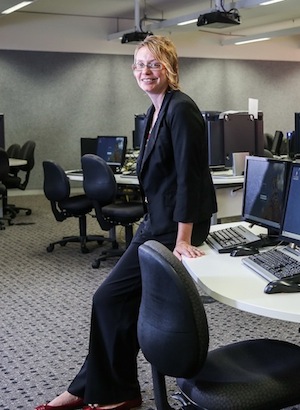Taking computer skills to the classes

Associate Professor Katrina Falkner
Associate Professor Katrina Falkner had very little exposure to computing when she first stepped foot on campus in North Terrace as a young student.
In fact, she was originally considering a career in science. "It wasn't until I chose computer science as an elective in my first year at the University of Adelaide that I fell in love with the subject," says Associate Professor Falkner. "It's a very creative field in which you can combine logical thinking and problem solving, and I found it all fascinating." So much so that the subject became a major part of her life, leading to a successful academic career at the University and her recent appointment as new Head of Computer Science. That's quite an achievement in an area that tends to be the domain of men. But that's something Associate Professor Falkner is keen to change. "There seems to be a lot of stereotypes surrounding computer science and sometimes young women aren't getting the best advice," she says. "There are perceptions that it isn't about people and that's wrong - you can't build a software system without talking to people and understanding what they want." Education is the best way of changing attitudes and has been a major passion and research focus for Associate Professor Falkner. And it's a two-way approach - helping educators to embrace computing but also using computing to support the teaching process. This is a key focus of the University's Computer Science Education Research Group under Associate Professor Falkner's leadership. She is also project leader of a new program being run in partnership with Google to help primary school teachers introduce the concept of computational thinking to their students. These are problem-solving skills which will feature in the new national digital technologies curriculum. "We're going to be one of the first countries that teaches computational thinking in the first year of primary and we need to make sure teachers are comfortable with the changes," says Associate Professor Falkner. "It's about moving away from being just a user of technology to being able to create the new technology. Computer science is really not that difficult - it's all about breaking problems down into individual steps." Associate Professor Falkner's other big research interest is far removed from the classroom. She works in defence trying to predict how software systems will perform before they are actually built. This is a major focus of the University's Defence Information Group which is working closely with Australia's principal defence research entity, Defence Science and Technology Organisation. "The research has significant implications for defence," says Associate Professor Falkner. "You need to know beforehand if a complex software system is not going to be fast enough for user requirements or take up more memory than the computer has to work on. The consequences of getting it wrong can be quite significant."
|





